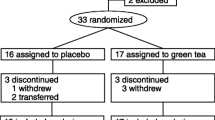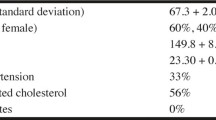Abstract
Objectives
This study aimed to examine the effects of green tea extract on working memory in healthy younger (21 - 29 y) and older (50 - 63 y) women.
Design
A single-blind, placebo-controlled, crossover design was used.
Setting
A university laboratory.
Participants
Twenty non-smoking Caucasian women were recruited in the younger (10) and older (10) age group.
Intervention
Subjects received 5.4 g green tea extract (at least 45% epigallocatechin-3-gallate) or placebo (cornstarch) within a 24-hour period.
Measurements
Working memory was measured by reading span and N-back task paradigm. Blood sample (20 mL) was collected and measured for plasma malondialdehyde (MDA) and total antioxidant capacity (TEAC) concentration. A 24-hour recall was conducted for each treatment period to ensure similar dietary patterns.
Results
Green tea extract significantly improved reading span performance in older women, indicated by higher absolute and partial scores of reading span. No significant changes were observed in the younger group. N-back latencies and accuracies were not significantly different after green tea treatment in either age group. Plasma concentration of MDA and TEAC were not different after green tea extract in either group.
Conclusion
Acute supplementation of decaffeinated green tea extract may enhance working memory capacity of women between 50 to 63 years of age. This study provides preliminary evidence that consumption of green tea extract may enhance the cognitive performance in older adults and thus provide potential chemopreventive benefits in this group. The mechanism should be explored in future research.

Similar content being viewed by others
References
Sang S, Lambert JD, Ho C-T et al. The chemistry and biotransformation of tea constituents. Pharmacol Res 2011;64:87–99. doi: 10.1016/j.phrs.2011.02.007.
Khan N, Mukhtar H. Tea polyphenols for health promotion. Life Sci 2007;81:519–533. doi: 10.1016/j.lfs.2007.06.011.
Hodgson JM, Croft KD. Tea flavonoids and cardiovascular health. Mol Aspects Med 2010;31:495–502. doi: 10.1016/j.mam.2010.09.004.
Yang CS, Lambert JD, Sang S. Antioxidative and anti-carcinogenic activities of tea polyphenols. Arch Toxicol 2009;83:11–21. doi: 10.1007/s00204-008-0372-0.
Legeay S, Rodier M, Fillon L et al. Epigallocatechin gallate: A review of its beneficial properties to prevent metabolic syndrome. Nutrients 2015;7:5443–5468. doi: 10.3390/nu7075230.
Ng T-P, Feng L, Niti M et al. Tea consumption and cognitive impairment and decline in older chinese adults. Am J Clin Nutr 2008;88:224–231.
Kuriyama S, Hozawa A, Ohmori K et al. Green tea consumption and cognitive function: A cross-sectional study from the tsurugaya project. Am J Clin Nutr 2006;83:355–361.
Park SK, Jung IC, Lee WK et al. A combination of green tea extract and l-theanine improves memory and attention in subjects with mild cognitive impairment: A double-blind placebo-controlled study. J Med Food 2011;14:334–343. doi: 10.1089/jmf.2009.1374.
Owen AM, Mc Millan KM, Laird AR et al. N-back working memory paradigm: A meta-analysis of normative functional neuroimaging studies. Hum Brain Mapp 2005;25:46–59. doi: 10.1002/hbm.20131.
Baddeley AD. Working memory: Theories, models, and controversies. Annu Rev Psychol 2012;63:1–29. doi: 10.1146/annurev-psych-120710-100422.
Baddeley AD, Hitch GJ. Working memory. In: Bower GA (ed) Psychology of learning and motivation: Advances in research and theory, Academic, New York, pp 1974;47–89
Feng L, Gwee X, Kua EH et al. Cognitive function and tea consumption in community dwelling older chinese in singapore. J Nutr Health Aging 2010;14:433–438. doi: 10.1007/s12603-010-0095-9.
Feng L, Chong MS, Lim WS et al. Tea consumption reduces the incidence of neurocognitive disorders: Findings from the singapore longitudinal aging study. J Nutr Health Aging 2016;20:1002–1009. doi: 10.1007/s12603-016-0687-0.
Feng L, Li J, Ng TP et al. Tea drinking and cognitive function in oldest-old chinese. J Nutr Health Aging 2012;16:754–758. doi: 10.1007/s12603-012-0077-1.
Borgwardt S, Hammann F, Scheffler K et al. Neural effects of green tea extract on dorsolateral prefrontal cortex. Eur J Clin Nutr 2012;66:1187–1192. doi: 10.1038/ejcn.2012.105.
Funahashi S. Prefrontal cortex and working memory processes. Neuroscience 2006;139:251–261. doi: 10.1016/j.neuroscience.2005.07.003.
Schmidt A, Hammann F, Woelnerhanssen B et al. Green tea extract enhances parietofrontal connectivity during working memory processing. Psychopharmacology (Berl) 2014;231:3879–3888. doi: 10.1007/s00213-014-3526-1.
Folstein MF, Folstein SE, Mc Hugh PR. «Mini-mental state». A practical method for grading the cognitive state of patients for the clinician. J Psychiatr Res 1975;12:189–198. doi: 10.1016/0022-3956(75)90026-6.
Conway ARA, Kane MJ, Bunting MF et al. Working memory span tasks: A methodological review and user’s guide. Psychon Bull Rev 2005;12:769–786. doi: 10.3758/bf03196772.
Daneman M, Carpenter PA. Individual differences in working memory and reading. J Verbal Learning Verbal Behav 1980;19:450–466. doi: 10.1016/s0022-5371(80)90312-6.
Jaeggi SM, Studer-Luethi B, Buschkuehl M et al. The relationship between n-back performance and matrix reasoning-implications for training and transfer. Intelligence 2010;38:625–635. doi: 10.1016/j.intell.2010.09.001.
Wang Z, Neal BH, Lamb JC et al. Mechanistic investigation of toxaphene induced mouse liver tumors. Toxicol Sci 2015;147:549–561. doi: 10.1093/toxsci/kfv151.
Re R, Pellegrini N, Proteggente A et al. Antioxidant activity applying an improved abts radical cation decolorization assay. Free Radic Biol Med 1999;26:1231–1237.
Redick TS, Broadway JM, Meier ME et al. Measuring working memory capacity with automated complex span tasks. Eur J Psychol Assess 2012;28:164–171. doi: 10.1027/1015-5759/a000123.
Mattay VS, Fera F, Tessitore A et al. Neurophysiological correlates of age-related changes in working memory capacity. Neurosci Lett 2006;392:32–37. doi: 10.1016/j.neulet.2005.09.025.
Ide K, Yamada H, Takuma N et al. Green tea consumption affects cognitive dysfunction in the elderly: A pilot study. Nutrients 2014;6:4032–4042. doi: 10.3390/nu6104032.
Jaeggi SM, Buschkuehl M, Perrig WJ et al. The concurrent validity of the n-back task as a working memory measure. Memory 2010;18:394–412. doi: 10.1080/09658211003702171.
Turner ML, Engle RW. Is working memory capacity task dependent? J Mem Lang 1989;28:127–154.
Chow SHH, Cai Y, Hakim I et al. Pharmacokinetics and safety of green tea polyphenols after multiple-dose administration of epigallocatechin gallate and polyphenon e in healthy individuals. Clin Cancer Res 2003;9:3312–3319.
Chow SHH, Hakim I, Vining DR et al. Effects of dosing condition on the oral bioavailability of green tea catechins after single-dose administration of polyphenon e in healthy individuals. Clin Cancer Res 2005;11:4627–4633. doi: 10.1158/1078-0432.ccr-04-2549.
Author information
Authors and Affiliations
Corresponding author
Rights and permissions
About this article
Cite this article
Liu, Y., Fly, A.D., Wang, Z. et al. The Effects of Green Tea Extract on Working Memory in Healthy Women. J Nutr Health Aging 22, 446–450 (2018). https://doi.org/10.1007/s12603-017-0962-8
Received:
Accepted:
Published:
Issue Date:
DOI: https://doi.org/10.1007/s12603-017-0962-8




